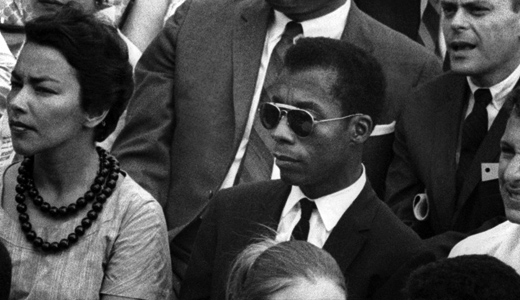I AM NOT YOUR NEGRO
Magnolia Pictures
Reviewed by: Harvey Karten, Shockya
Grade: A-
Director: Raoul Peck
Written by: Raoul Peck, James Baldwin
Cast: James Baldwin, Samuel L. Jackson (narrator), Malcolm X, Martin Luther King Jr., Robert Kennedy
Screened at: Critics’ DVD, NYC, 2/3/17
Opens: February 4, 2017
Buy I Am Not Your Negro on Amazon.com today.
Great changes in societies are often brought about by violent action, the action itself an outgrowth of intellectual manifestoes. If Robespierre was the firebrand of the French Revolution, then Montesquieu would serve as its literary underpinning. Similarly, think Ulysses S. Grant as the leader of the North in the American War Between the States and Harriet Beech Stowe (“the little lady who started the great big war”) as its theoretical justification. George Washington and Tom Paine (fill in the blanks). And now, to reduce a complex issue plaguing America for 400 years to two people, look at Malcolm X as a firebrand of the civil rights movement and James Baldwin as its literary justification. Baldwin’s leading best-seller “The Fire Next Time” in 1963 urged black people to stop aspiring to be just like the whites and to take action to undo the four hundred years of oppression in America. Perhaps Malcolm X, who urged blacks to stop turning the other cheek when jeered and beaten by whites, stands out above all others in his rage against the machine.
Raoul Peck’s “I Am Not a Negro,” is based on the thirty-page manuscript on which Baldwin was working when he died in 1987, now given cinematic life with Samuel L. Jackson’s narration and frequent appearances by Baldwin on such shows as Dick Cavett’s, at a time that blacks were called Negroes. Cavett, then thirty-two years old and in his first year on TV, gently baits his guest, asking “Haven’t Negroes come a long way since the end of slavery and especially reflected through the 1964 Civil Right Act?” Baldwin replies, more or less, that whites may have no idea the extent to which blacks are despised, as witnessed the undue force used by police when arresting “Negroes,” one of the many points that bring this 1987 manuscript right up to the present day and beyond. (In Baldwin’s day there were no iPhones and therefore no way to make so much use of unnecessary brute force by police departments in the North as well as the South.)
James Baldwin, whose dates are 1924-1987, might not necessarily be hounded by the press to appear on talk shows since literary figures chatting on TV today might be as rare as streets in New York named after authors. Haitian born Raoul Peck, whose “Lumumba” seventeen years ago deals with the rise to power and brutal assassination of the now-redeemed leader of the Congo, is now at the helm of a collage of shots going right up to the present, but spends most of his time showing the 20th Century roots of brutality, such as a crowd of white “crackers” laughing at black men who had been lynched by them. Similarly we watch the grins of young white people who show their contempt for blacks who want only to enter schools, the stupid smiles giving away the idea that these oppressors are not enraged but rather are having fun as bullies.
For the lighter side of the movie, we look at Hollywood clips that glorify the white man, such as in the Westerns when the cavalry battled the Indians and an especially violent clip from “The Defiant Ones” in which two prisoners on the run, one black and one white handcuffed together, throw fists around as though they want to kill each other. Baldwin had spent many years of his life in Paris, though we little to nothing of his life there, but expresses the view that he could simply not stay abroad while his brothers and sisters were being beaten. He longed to return to Harlem much like most expats probably miss home despite living the good life in European communities.
Perhaps most important is Baldwin’s rejection of the liberal attitude: that all black need is a patina of civil rights legislation to be accepted in their own country. The author believes that all the legislation in the world could not get whites to see their common humanity with their fellow Americans. This deficiency, he says, is destined to destroy our values, and given the accession of the current President thirty years after Baldwin’s manuscript, we appear once again to be headed in the wrong direction.
Rated PG-13. 93 minutes. © Harvey Karten, Member, New York Film Critics Online
Comments, readers? Agree? Disagree? Why?
Story – A-
Acting – B+
Technical – B+
Overall – A-

